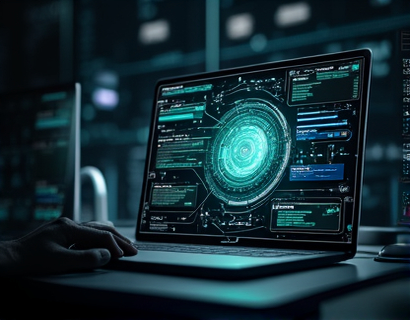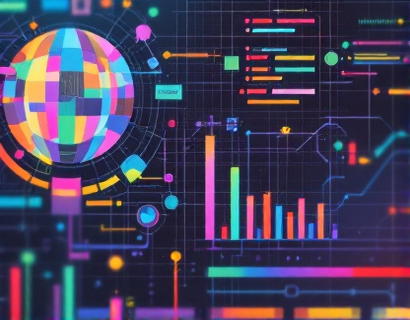Crypto and AI: Transforming Digital Engagement with Next-Gen Ucosystem Solutions
The intersection of cryptocurrency and artificial intelligence (AI) is giving rise to a new era of digital engagement, redefining how users interact with apps and services. This transformation is not just about integrating two cutting-edge technologies; it's about creating a seamless, secure, and highly personalized user experience. The fusion of blockchain's decentralized nature with AI's predictive and adaptive capabilities is unlocking unprecedented opportunities for app ecosystems, driving growth and enhancing user engagement across the tech landscape.
Understanding the Synergy Between Crypto and AI
The synergy between cryptocurrency and AI is rooted in their shared foundation of innovation and disruption. Cryptocurrency, particularly blockchain technology, offers a decentralized and transparent way to conduct transactions, ensuring security and trust without the need for intermediaries. AI, on the other hand, brings intelligence and adaptability to digital systems, enabling them to learn from data, improve over time, and perform tasks that traditionally required human intervention.
When combined, these technologies create a powerful ecosystem where apps can leverage AI to enhance user experiences while utilizing blockchain to ensure data integrity and user privacy. This partnership is not just theoretical; it's already being implemented in various sectors, from finance and healthcare to gaming and social media, setting new standards for connectivity and innovation.
Enhanced Security and Privacy
One of the most significant benefits of integrating AI with cryptocurrency is the enhancement of security and privacy. Blockchain's immutable ledger ensures that once data is recorded, it cannot be altered or deleted, providing a robust layer of security. AI can further bolster this by detecting and mitigating potential threats in real-time, identifying patterns that indicate fraudulent activity or security breaches.
For instance, AI-driven algorithms can monitor transaction patterns and user behavior to flag anomalies, thereby preventing unauthorized access and ensuring that user data remains confidential. This level of security is crucial in a world where data breaches and cyber attacks are becoming increasingly common, making the combination of crypto and AI an attractive solution for users and businesses alike.
Personalized User Experiences
AI's ability to analyze vast amounts of data and derive meaningful insights is a game-changer for personalizing user experiences. In the context of app ecosystems, AI can tailor content, recommendations, and interactions based on individual user preferences and behaviors. This personalization not only enhances user satisfaction but also increases engagement and retention rates.
For example, a streaming service can use AI to analyze a user's viewing history and preferences to suggest new shows or movies that align with their interests. When this service is built on a blockchain foundation, it ensures that user data is securely stored and managed, giving users greater control over their information. The result is a more engaging and trustworthy platform that keeps users coming back.
Decentralized Applications (DApps)
Decentralized Applications (DApps) are a prime example of how crypto and AI are transforming digital engagement. DApps leverage blockchain technology to operate on a decentralized network, eliminating the need for central authorities and intermediaries. AI enhances these applications by providing intelligent and adaptive functionalities, making them more efficient and user-friendly.
In the finance sector, DApps can offer decentralized lending and borrowing platforms where AI algorithms assess creditworthiness and manage risk in real-time. In gaming, DApps can create immersive experiences where AI-driven NPCs (non-player characters) and dynamic game environments keep players engaged. The decentralized nature of these apps ensures that users have more control over their data and assets, fostering a sense of community and trust.
Smart Contracts and Automated Processes
Smart contracts, self-executing contracts with the terms directly written into code, are another area where crypto and AI converge to transform digital interactions. AI can optimize smart contracts by analyzing data and predicting outcomes, ensuring that the conditions of the contract are met efficiently and accurately.
For instance, in supply chain management, AI can track and verify the movement of goods, while smart contracts can automatically execute payments and updates based on predefined conditions. This not only streamlines processes but also reduces the risk of errors and fraud, leading to more reliable and transparent transactions.
Enhanced User Interfaces and Experiences
The integration of AI in app design is revolutionizing user interfaces (UIs) and user experiences (UX). AI can analyze user interactions and feedback to continuously improve the design and functionality of apps. For example, AI-powered chatbots can provide instant customer support, answering queries and resolving issues in real-time, thereby enhancing user satisfaction.
Moreover, AI can optimize UI elements based on user behavior, such as adjusting font sizes, colors, and layout to ensure a comfortable and accessible experience for all users. This level of customization is particularly beneficial for users with disabilities, making digital platforms more inclusive and user-friendly.
Data-Driven Decision Making
AI's ability to process and analyze large datasets provides valuable insights that can drive data-driven decision making within app ecosystems. For developers and businesses, AI can identify trends, predict user behavior, and optimize marketing strategies, leading to more effective and targeted campaigns.
For users, these insights can translate into a more tailored and relevant experience. For example, a fitness app can use AI to analyze a user's workout data and provide personalized training plans and nutrition advice, all while ensuring that the data is securely stored on a blockchain to maintain privacy.
Challenges and Considerations
While the integration of crypto and AI offers numerous benefits, it also comes with challenges that need to be addressed. One of the primary concerns is the regulatory landscape, as both cryptocurrencies and AI are still evolving and often operate in gray areas legally. Ensuring compliance with regulations while leveraging the full potential of these technologies is crucial for sustainable growth.
Another challenge is the technical complexity involved in integrating blockchain and AI systems. Developers need to possess a deep understanding of both technologies to create seamless and efficient solutions. Additionally, user education is essential to ensure that the benefits of these advancements are fully realized and that users feel comfortable and secure using these new tools.
Future Prospects
The future of digital engagement through the combination of crypto and AI is promising. As technology continues to advance, we can expect even more innovative applications and integrations. For instance, the development of interoperable blockchain networks will enable seamless interactions between different DApps, creating a more connected and cohesive ecosystem.
Furthermore, the advancement of AI in areas such as natural language processing and computer vision will lead to more intuitive and interactive user experiences. The potential for augmented reality (AR) and virtual reality (VR) applications built on blockchain and powered by AI is also immense, opening up new frontiers for entertainment, education, and beyond.
In conclusion, the fusion of cryptocurrency and AI is not just a technological trend but a transformative force reshaping the digital landscape. By enhancing security, personalizing experiences, and enabling decentralized and automated processes, this synergy is setting new standards for user engagement and connectivity. As the tech community continues to explore and innovate in this space, the possibilities for creating more robust, secure, and user-centric digital ecosystems are limitless.










































